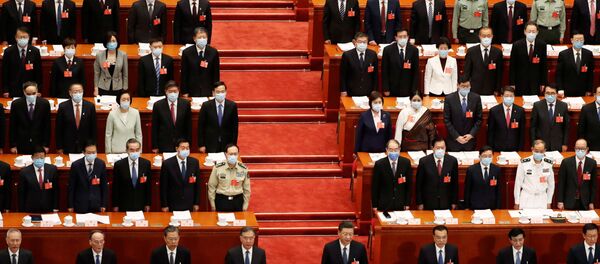Abishur Prakash discussed the geopolitical implications of artificial intelligence (AI) and other emerging technologies, as well as forces behind 'tech nationalism' leading to rapid shifts in power and influence in the current global order.
Mr Prakash is the leading global authority on geopolitical futurism and works for the Toronto-based strategy consulting firm Center for Innovating the Future. He has authored four books, including Next Geopolitics: Volume 1 and 2, Geopolitics of Artificial Intelligence (Go.AI), and The Age of Killer Robots.
Sputnik: The rise of AI will unequivocally reshape humanity's relationship to technology and subsequently, human-to-human relationships. What is your general outlook on AI and which existential conversations should society have about it? Which arguments have been presented by Center for Innovating the Future (CIF)?
I remember speaking at a conference in Silicon Valley a few years ago. Toward the end of my keynote, someone in the audience asked me about “robot consciousness”. Could robots one day gain an awareness and intelligence like humans? I have to admit, I was taken aback. After all, my talk was on geopolitics of technology, not philosophy!
My answer was that we are creating a technology (AI) with the intention of having it exceed our own intelligence. We want AI to be better than us at almost everything: driving cars, diagnosing disease, investing money, recommending products, and even finding love.
But, no matter how intelligent AI becomes, or how much we depend on it, humans may always view AI as just a technology. For me, this is the most existential question. Will humans ever view AI as equal to them?
Of course, different cultures and geographies will perceive AI differently, but, the fact that humanity may be divided on whether AI is a “new species” or just another “industrial revolution,” is in itself, an huge shift.
At CIF, at the root of everything we do, is the belief that the future of business and geopolitics is unlike anything that has come before it. There is no precedent or playbook to pick up and run with. The world is quite literally entering a twilight zone.
We coined concepts like “Algotient™,” “Algopoly,” “Coexisting with Robots™” and “New Algorithmic Age” so clients understand that what’s taking place with AI and robotics are just not “trends" or “risks.” This isn’t “business as usual” with a slight twist. Instead, what’s taking place is a complete reconfiguration in how the world operates. It is quite fascinating.
In one client engagement in Los Angeles, regarding the future of an industry, the most time was spent on a deep philosophical conversation about humans and machines.
Sputnik: Could you explain to our readers the concept of Next Geopolitics? What are some of the most important examples you've found and could you explain your primary concerns in the ongoing intercontinental tech race?
In 2013, when the world was just waking up to geopolitics of technology, I coined the expression “Next Geopolitics.” Since then, it has taken on a world of its own with books, interviews and public speaking.
At its core, Next Geopolitics revolves around a basket of emerging technologies, including AI, robotics, virtual reality, blockchain, quantum computing and gene editing and how they could reshape geopolitics.
An example of Next Geopolitics is what I call “Data Nationalism”.
Right now, nations are implementing data laws because of rising nationalistic sentiment. Take India. It has passed data localization laws and is preparing more policies around open marketplaces for data.
In other words, India does not want large technology firms, many of whom are American and Chinese, to have a monopoly over its local sectors. Guess how US reacted to India’s data laws? It threatened it with H1-B visas! For the first time, US may decide immigration policy by looking at another nation’s data policy. This is how powerful technology has become.
As the world goes deeper into Next Geopolitics, I have several concerns.
Second, nations are acting in sporadic and unpredictable ways. Take the Marshall Islands. They are ditching the USD and creating their own digital currency. Except, who is helping them do this? Israel! One of America’s closest allies is helping a nation in the Pacific Ocean ditch the USD and create an alternative.
Third, how nations grow their power is fundamentally changing. China’s One Belt, One Road (OBOR) is one example. But, what about what BMW has done? The automaker made its self-driving car algorithms open source.
Now, in Next Geopolitics, businesses are in the driver’s seat. They are the ones driving soft power, defining new ecosystems and connecting countries in new ways.
Sputnik: A recent London Futurists meeting discussed ways to regulate the development of AI. Should this take place at the government or societal level, decentralised or centralised, public or private sector, or combinations of all? What issues should be addressed in such groups as the Global Partnership on AI, ERA-LEARN and others?
There must be regulation around AI, but it must be application-specific. Take self-driving cars. At this point, regulating self-driving cars could stifle innovation and potentially hold back the industry.
But, then, on the other hand, we have killer robots and autonomous weapons as noted in my book “The Age of Killer Robots”. Even though these weapons may be years from being deployed, the world must start creating policy and rules today.
However, this leads to a separate issue. Who should be doing the regulating? Government, private sector, or an institution?
We used to live in an era where there was a single global institution for everything such as the World Health Organisation, World Trade Organisation, United Nations, and others. Now, this is no longer the case. Right now, you have multiple organizations competing to set the rules for AI.
Think about this for a second. Different groups, stemming from the same culture, may be clashing over how AI should be regulated.
And, in all of this, companies and cities have no voice. It is only governments and religion that are the stakeholders. Who is to say businesses, like Alibaba or Alphabet, can’t set their own rules and ignore governments? Or, what about megacities, like NEOM or Pearl River Delta, who are becoming mini-nations in themselves?
This is why, earlier this year, I proposed the concept of “AI20,” a new global group made up of countries, companies and cities, to manage how AI Is used around the world. It’s important that when governing and regulating AI, all the relevant parties, including countries, companies and cities, are involved.
Regardless of who is regulating, whether it’s a global group, a megacity or a board room of executives, there are two key areas that must be addressed: bias and interoperability.
Bias is emerging in many AI-applications, like facial recognition systems and hiring algorithms. People are being discriminated against because of their skin color, religion or gender. Some facial recognition systems are reaching the point where they can even identify emotions or can identify people based on the way they walk. This in itself could lead to new political clashes.
There must be common rules, at least among common cultures, to ensure these systems don’t infringe on people’s freedoms and lifestyles.
At the same time, interoperability is extremely important. This is the ability of different AI-systems, developed at different times or in different languages, to communicate with one another. Take defense. Right now, the Pentagon is working on a project to put deep sea drones in oceans all over the world. These drones will sit there until needed.
Now, the Pentagon isn’t going to keep on replacing these drones every year. These drones may sit there, unused, for several years. And, in the meantime, brand new drones may be developed, in new programming languages.
How will the US ensure that its old and new drones can work together if the need arises? Or, how will British and Brazilian autonomous drones communicate with each other? There is a big void when it comes to answering these questions. Without common systems and languages, AI-systems may be unable to communicate with each other, potentially leading to chaos.
Sputnik: China's economic and now, technological rise is evident in its role in the 3GPP, GSMA, IEEE, New Silk Road, Huawei and others, with AI remaining a central component in the National People's Congress investment plan presented this month. The US, UK, and EU and others have cited this rise in think tanks and policy research in recent years as an impetus for launching national and supranational countermeasures, namely in relation to the State Council's New Generation Artificial Intelligence Development Plan announced in 2017. US president Donald Trump's trade war has been the most reported and overt example of such responses. Are such views on China productive, and should Western nations adopt a cooperative or competitive approach to Beijing, or both? In which ways?
The trade war is a balancing act. On one hand, US and China are deeply interlinked and interconnected. But, on the other hand, both nations view each other as a threat. It’s almost like your best friend being your biggest enemy.
Before, the trade war was about soybeans and automotive parts. Now, it’s becoming all about emerging technologies, be it AI or semiconductors.
Consider that at the beginning of 2018, Alibaba, China’s equivalent to Amazon, signed a deal to export the “City Brain” AI system to Kuala Lumpur in Malaysia. By 2019, Malaysia had also bought Chinese facial recognition cameras and was rolling out City Brain across the country. In the past, it took US decades to spread its technology around the world. But, it took less than 18 months for China’s AI to spread throughout Malaysia.
Of course, both sides have fair points. In the West and countries like India, there are fears that Chinese technology comes riddled with surveillance, but in China, entrepreneurs and policy makers reply: Couldn’t China feel the same way about iPhones? And, why can’t China have global technology firms, just like US and Europe?
There’s no right or wrong here. And that’s what makes cooperation so difficult. The West and China are two different ideologies and cultures.
Yesterday, when there was only one giant, this was manageable. But, when you have two, three or four giants in one room, things change. China wants a voice, but the West doesn’t want it too loud. The West wants free trade, but China doesn’t want too many non-Chinese goods.
— Naushad K Cherrayil (@ncherrayil) June 3, 2020
Also, it’s important to not view geopolitics of technology through a narrow lens and only see it as US-China. It’s far bigger than that. It’s also Russia, India, Israel, Japan, UAE, UK, South Korea and Australia. Dozens of nations are fighting for power, creating new innovations and rewriting the rules of geopolitics.
Of course, there is always the possibility for change, but someone has to make the first move. Right now, nations are doubling down in the respective camps.
In many ways, the world is in the middle of a huge transition. Countries are moving from the old world of geopolitics to the new world of geopolitics. Some are being forced, while others are choosing to move. As this accelerates, new alliances will be forged, new conflicts will begin, new players will rise and a new status quo will be created.







